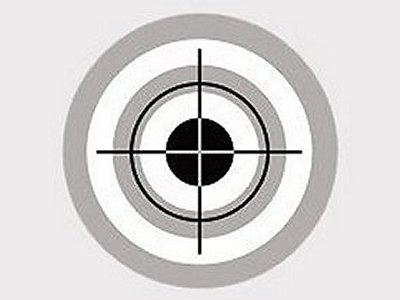
STANDING TARGET
Sometimes the most ridiculous strategies in life turn out right
Get a grip, we are told. Controlling our own lives is a mark of adulthood but probably overrated. As we begin to trust one another less, we feel the need to control more of our environment. Outcomes cannot be left to others; we must be in charge, and if we are not, we monitor carefully what others do. This can be seen in the highly evolved audit culture which governs our common life but also in the smaller, daily transactions between people. Controlling behaviour is a buzz concept, but rarely do we stop to think about the link between it and the loss of trust.
The second book of Chronicles, probably not high on the Harvard Business School reading list, has something pertinent to say about strategy and those who locate their trust in the goodness of God. In a time when Judah and Israel were governed by a succession of dodgy monarchs, Jehoshaphat was relatively enlightened and progressive. He ensured people were taught the law; he dealt with idolatrous shrines; he created a proper system of courts; he built strong defences. And he also knew how to react in a crisis.
The news in chapter 20 that a huge army was massing against Judah from the east, incalculably larger than anything Jehoshaphat could muster, might have overwhelmed a lesser king. The decision to call an assembly of the people was inspired. It drew the nation together and afforded Jehoshaphat the chance to offer clear leadership under God. He intercedes for the people in prayer, drawing to God’s attention not just what he had done for them before but what he promised those who would call on him in a crisis. The response came from the body of the assembly, remarkable evidence of the equality of the people. And the prophecy of Jahaziel for the gathering has an unnerving feel to it:
Do not be afraid or dismayed because of this vast army. For the battle is not yours, but God’s…You will not have to fight this battle. Take up your positions; stand firm and see the deliverance the Lord will give you.
Jehoshaphat’s only contribution to this instruction is to send out singers – yes, musicians – at the head of the army to make praise to God. The army they oppose - made up of different ethnicities and interests - turns on itself and does the job for Judah without anyone lifting a spear.
Who in their right minds goes into battle with no plan but to put the music group at the front? Our response to the highly complex challenges which threaten to overwhelm us is to demand a strategy that shows us how a problem will be overcome. Good planning is vital in life, but strategies should never be given talismanic status, as if their mere existence wards off all that could hurt or undermine us. The truth we are rarely prepared to admit is that, given we cannot control other people’s responses, the plans we make often don’t work out how we intended. Our own response to a failure of strategy is usually to plan more strategically and to work harder.
Jehoshaphat took his lead from a very specific prophecy; it could not have universal applicability, but its presence in scripture is not accidental. There are times when we feel beyond our ability to cope, when every option in front of us seems hopeless and defeat or humiliation inevitable. The whole point of grace is to offer us something we neither deserve nor can deliver ourselves. Standing still and waiting for God’s intervention is sometimes precisely the strategy we are called to adopt. Perhaps we don’t employ it as often as we ought. When a helicopter lowers a winch to lift a stranded climber to safety, it doesn’t pay to be a moving object; a rescuer needs a motionless target.
There was something moving and audacious about Judah’s troops that day. Battle is bloody, painful and distressing and the mind struggles to placate the rising fear before first contact. Judah went in worshipping the Lord; they had no intention of lifting a weapon. Nerves of steel are forged in the sacrifice of praise. Faith is sometimes putting yourself in the line of fire and walking straight ahead regardless because ‘you will not have to fight this battle’.
POPULAR ARTICLES

Obama's Covert Wars
The use of drones is going to change warfare out of all recognition in the next decades.

Through A Glass Starkly
Images of traumatic incidents caught on mobile phone can be put to remarkable effect.

What Are British Values?
Is there a British identity and if so, what has shaped the values and institutions that form it?


